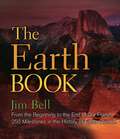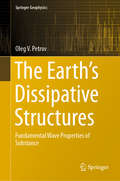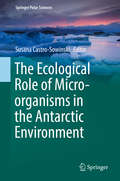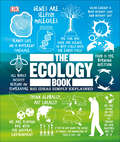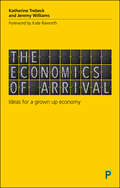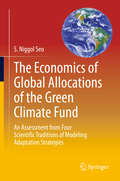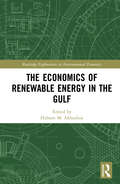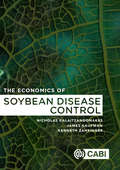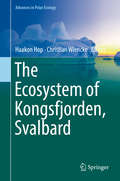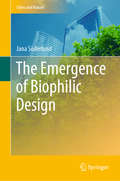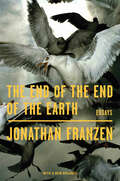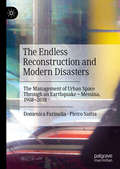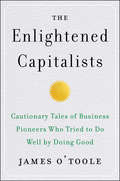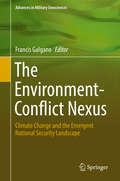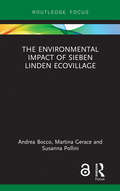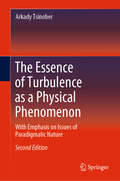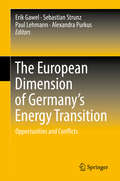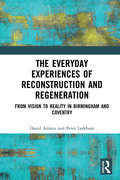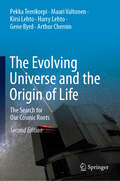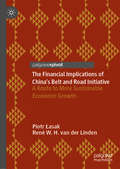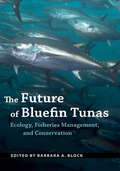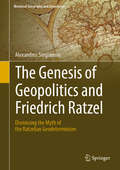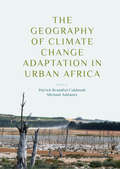- Table View
- List View
The Earth Book: From the Beginning to the End of Our Planet, 250 Milestones in the History of Earth Science (Union Square & Co. Milestones)
by Jim BellA beautifully illustrated presentation of 250 milestones in the history of our home planet, from celebrated geologist and planetary scientist Jim Bell. Spanning Earth&’s entire history, from its birth 4.6 billion years ago to its inevitable destruction billions of years into the future, this stunning volume chronicles the life of our home planet in 250 well-chosen milestones. Jim Bell leads us on a tour of the events, processes, people, and places that have shaped our growing knowledge of Earth, from the oceans&’ formation and the first perilous polar expeditions to deadly volcanoes and Earth &“selfies&” from space. He covers relevant topics in a range of fields, including physics, chemistry, biology, astronomy, geology, mineralogy, planetary science, life science, public policy, atmospheric/climate science, and engineering, along with notes on key scientists and inventors. At a time when it's crucial to understand Earth as a complex interdependent system, and our role in that system, The Earth Book will enhance your appreciation of our home.
The Earth's Dissipative Structures: Fundamental Wave Properties of Substance (Springer Geophysics)
by Oleg V. PetrovThis volume describes physical, formal mathematical and exterior (morpho-structural) manifestations of wave dynamics of the Earth, defining both its deep structural image, and the external shape of planet. In addition to the standard imagination about waves in the geological environment as short-term seismological and seismic effects, wave dynamics of the Earth are considered as long-time process, comparable to the geochronological scale. The book consists of a systematic description of the conformities discovered in the set of heterogeneous and different-order objects, which have space-related regularity and recurrence at the different levels of resolution of analysis of natural systems. For expert-geologist it includes the basis of the geodynamic wave-related concept which enables to add to the traditional concept of plate tectonics, as well as the methods of quantitative interpretation of measured geo-fields.
The Ecological Role of Micro-organisms in the Antarctic Environment (Springer Polar Sciences)
by Susana Castro-SowinskiThis book provides up-to-date multidisciplinary information regarding microbial physiological groups in terms of their role in the Antarctic ecology. How do microorganisms shape the Antarctic environment? The book presents a thorough overview of the most important physiological microbial groups or microbial systems that shape the Antarctic environment. Each microbial model is described in terms of their physiology and metabolism, and their role in the Antarctic environmental sustainability. The individual chapters prepare readers for understanding the relevance of the microbial models from both an historical perspective, and considering the latest developments. This book will appeal to researchers and teachers interested in the Antarctic science, but also to students who want to understand the role of microbes in the ecology of extreme environments.
The Ecology Book: Big Ideas Simply Explained (DK Big Ideas)
by DKLearn about species, environments, ecosystems and biodiversity in The Ecology Book.Part of the fascinating Big Ideas series, this book tackles tricky topics and themes in a simple and easy to follow format. Learn about Ecology in this overview guide to the subject, great for novices looking to find out more and experts wishing to refresh their knowledge alike! The Ecology Book brings a fresh and vibrant take on the topic through eye-catching graphics and diagrams to immerse yourself in. This captivating book will broaden your understanding of Ecology, with:- More than 90 of the greatest ideas in ecology- Packed with facts, charts, timelines and graphs to help explain core concepts- A visual approach to big subjects with striking illustrations and graphics throughout- Easy to follow text makes topics accessible for people at any level of understandingThe Ecology Book is a captivating introduction to what&’s happening on our planet with the environment and climate change, aimed at adults with an interest in the subject and students wanting to gain more of an overview. Here you&’ll discover more than 90 of the greatest ideas when it comes to understanding the living world and how it works, through exciting text and bold graphics.Your Ecological Questions, Simply ExplainedHow do species interact with each other and their environment? How do ecosystems change? What is biodiversity and can we afford to damage it? This fresh new guide looks at our influence on the planet as it grows, and answers these profound questions. If you thought it was difficult to learn about this field of science, The Ecology Book presents the information in a clear layout. Learn the key theories, movements, and events in biology, geology, geography, and environmentalism from the ideas of classical thinkers in this comprehensive guide.The Big Ideas SeriesWith millions of copies sold worldwide, The Ecology Book is part of the award-winning Big Ideas series from DK. The series uses striking graphics along with engaging writing, making big topics easy to understand.
The Economics of Arrival: Ideas for a Grown-Up Economy
by Jeremy Williams Katherine TrebeckWhat do we want from economic growth? What sort of a society are we aiming for? In everyday economics, there is no such thing as enough, or too much, growth. Yet in the world’s most developed countries, growth has already brought unrivalled prosperity: we have ‘arrived’. More than that, through debt, inequality, climate change and fractured politics, the fruits of growth may rot before everyone has a chance to enjoy them. It’s high time to ask where progress is taking us, and are we nearly there yet? In fact, Trebeck and Williams claim in this ground-breaking book, the challenge is now to make ourselves at home with this wealth, to ensure, in the interests of equality, that everyone is included. They explore the possibility of ‘Arrival’, urging us to move from enlarging the economy to improving it, and the benefits this would bring for all.
The Economics of Global Allocations of the Green Climate Fund: An Assessment from Four Scientific Traditions of Modeling Adaptation Strategies
by S. Niggol SeoThis book provides an incisive and economic assessment of the global warming adaptation policy and programs carved out by the United Nations Framework Convention on Climate Change, the Green Climate Fund (GCF), by relying on the four scientific traditions that have been advanced on the economics of adaptation to climate change in agricultural and natural resource enterprises. Substantially expanding and refocusing on the book Micro-behavioral Economics of Global Warming: Modeling Adaptation Strategies in Agricultural and Natural Resource Enterprises published by Springer in 2015, this book elucidates the theories and summarizes the empirical results and predictions from the four traditions of adaptation modelling: a microbehavioral economic model of adaptation, an agronomic-economic modelling, a statistical model of yield/productivity changes, and an ecosystem model of climate change impacts. The four modeling traditions are freshly analyzed and applied to the assessments of the 93+ GCF-funded projects and programs through the end of 2018.
The Economics of Renewable Energy in the Gulf (Routledge Explorations in Environmental Economics)
by Hisham M. AkhonbayThe Cooperation Council for the Arab States of the Gulf (GCC) has been at the epicenter of global energy markets because of its substantial endowment of hydrocarbons. Yet countries in the region have also stated their intent to be global leaders in renewable energy. This collection explores the drivers for the widespread adoption of renewable energy around the GCC, the need for renewable energy and the policy-economic factors that can create success. All six countries within the GCC have plans to include renewable energy power generation in their energy mix for various reasons including: a growing demand for electricity because of increasing populations, an increasing government fiscal deficit due to inefficient subsidies, the need to diversify the economy and global pressure to meet climate change requirements. However, the decision of when and by how much to introduce renewable energy is fraught with complications. In this book, a stellar cast of regional policy and academic experts explore the reasons behind these renewable energy plans and the potential impediments to success, whether it be the declining cost of producing energy from hydrocarbons, an infrastructure which needs to be updated, social acceptance, lack of financing and even harsh weather. Weighing up all these factors, the book considers the route forward for renewable energy in the Gulf region. The Economics of Renewable Energy in the Gulf offers an excellent examination of the adoption of renewable energy in the area. It will be of great interest to academic researchers and policy makers alike, particularly those working in the areas of energy economics, public policy and international relations.
The Economics of Soybean Disease Control
by Nicholas Kalaitzandonakes James Kaufman Kenneth ZahringerWorldwide soybean crop yields can achieve USD$130 billion per year in farm-level sales, but around 13% of these yields are lost to disease. Effective disease management could generate significant economic benefits, and while disease management strategies do exist, their application remains limited among producers, often due to an incomplete understanding of disease incidence and severity, as well as perceived complexities of these strategies and a lack of information regarding success rates. This book presents an economic perspective on disease control, with an emphasis on producer choice among alternative technologies and potential changes in cropping systems. It provides an overview of global soybean diseases, their economic significance and management, and covers farm-level decision making, economic payoffs of alternative disease practices and key uncertainties. The book also outlines a global economic model that evaluates disease distribution and management implications. Key features include: - Extensive empirical case studies of soybean disease control, offering strategies for economically optimal management of diseases such as soybean seedling disease and root rot. - Analysis of economic factors to guide farm-level decision making. - Consideration of new technologies in disease management and their potential market-level impacts. This text is recommended for students and researchers in plant pathology and agricultural economics, as well as professionals in the soybean production industry.
The Economics of Soybean Disease Control
by Nicholas Kalaitzandonakes James Kaufman Kenneth ZahringerWorldwide soybean crop yields can achieve USD$130 billion per year in farm-level sales, but around 13% of these yields are lost to disease. Effective disease management could generate significant economic benefits, and while disease management strategies do exist, their application remains limited among producers, often due to an incomplete understanding of disease incidence and severity, as well as perceived complexities of these strategies and a lack of information regarding success rates. This book presents an economic perspective on disease control, with an emphasis on producer choice among alternative technologies and potential changes in cropping systems. It provides an overview of global soybean diseases, their economic significance and management, and covers farm-level decision making, economic payoffs of alternative disease practices and key uncertainties. The book also outlines a global economic model that evaluates disease distribution and management implications. Key features include: - Extensive empirical case studies of soybean disease control, offering strategies for economically optimal management of diseases such as soybean seedling disease and root rot. - Analysis of economic factors to guide farm-level decision making. - Consideration of new technologies in disease management and their potential market-level impacts. This text is recommended for students and researchers in plant pathology and agricultural economics, as well as professionals in the soybean production industry.
The Ecosystem of Kongsfjorden, Svalbard (Advances in Polar Ecology #2)
by Christian Wiencke Haakon HopThis book focuses in detail on all ecologically important aspects of the Kongsfjorden system such as the marine and atmospheric environment including long-term monitoring, Ecophysiology of individual species, structure and function of the ecosystem, ecological processes and biological communities.The contributed articles include review articles and research articles that have a wider approach and bring the current research up-to-date. This book will form a baseline for future work.
The Emergence of Biophilic Design (Cities and Nature)
by Jana SöderlundThis book addresses the emergence of biophilic design, a form of design that looks at people’s intrinsic connection with nature. There is no denying that biophilic design is rapidly expanding globally as an effective response to pressing issues in urban areas and built environments. From being a term few had heard of in 2012, when the author’s research began, to one that is currently trending in a broad range of disciplines, the story of its emergence has never been properly told. The story of the emergence of biophilic design is the story of a social movement and how a gathering of people with a common interest and passion can spark a global trend. The book and the stories within are not only engaging but also informative and educational, offering readers an in-depth understanding of what biophilic design is all about, and how to promote its implementation in their own built environment. Hopefully, they will inspire people to act, to campaign and to implement initiatives in their urban environment, with the confidence that they are capable of making a difference. The author spent three years researching the emergence of biophilic design, and why and how it was driven by certain people who championed the concept. Part of the author’s research involved a three-month tour of ten North American cities, during which she interviewed 26 key players. These people ranged from community leaders, landscape architects, and academics, to the CEOs of NGOs and government leaders. The result is a collection of stories that illustrate the evolution of biophilic design, and how it was frequently born from a passion for, belief in and love of nature, as well as a response to an urban crisis.
The End of the End of the Earth: Essays
by Jonathan FranzenFrom Jonathan Franzen, one of our preeminent writers and thinkers, comes a brilliant, searing essay collection that calls for us to take better care of our planet and one another in these troubled times.The End of the End of the Earth is a collection of Jonathan Franzen's essays and speeches from the past five years, in which he grapples with the most important and heated ethical subjects of the day: environmentalism, capitalism, wealth inequality, race, technology and the role of art. He challenges us to ask difficult questions: What is our civic responsibility in the face of climate change, the greatest ever threat to our planet and species? Does technology give us a sense of control or community or is it stripping these from us? Above all, in these essays, Franzen asks us to care--about causes great and small, with subjects as big as our planet and specific as a rare species of birds. These essays are in praise of empathy, and of the beauty and power of nature and art.This slim but powerful book is Franzen at his best, incisive, persuasive and compassionate.
The Endless Reconstruction and Modern Disasters: The Management of Urban Space Through an Earthquake – Messina, 1908–2018 (Disaster Studies)
by Domenica Farinella Pietro SaittaThis is a study on the long-lasting consequences of a disastrous earthquake that hit the city of Messina, Sicily, in 1908. The quake killed about 86,000 people, and destroyed one of the most important portal cities of the Mediterranean. The book investigates both the forces that shaped that event and made it possible – firstly, urban speculation processes at the end of the nineteenth century – and the role of that occurrence in creating a complex event that, on the one hand, accelerated trends and tendencies that were already in motion; and, on the other, produced an entirely new social space based on social separation and the raise of a widespread marginal class. Such a class developed within urban borders and spaces that, over the decades, grew according to the same logic and directions that followed the reconstruction. Especially the shacks, still a visible presence in the city, represent the lieu of reproduction both of a class and the whole of the social relations stemming from the disaster.It shows how key-concepts in contemporary scientific analysis, such as “shock economy” and “economy of disaster,” can be aptly backdated. Above all, this study broadens the normal analyses of disasters by showing the stratification of institutional techniques and economic forces that, over the decades, intervened and (re-)shaped the site of a disaster and its social structure.
The Enlightened Capitalists: Cautionary Tales of Business Pioneers Who Tried to Do Well by Doing Good
by James O'TooleAn expert on ethical leadership analyzes the complicated history of business people who tried to marry the pursuit of profits with virtuous organizational practices—from British industrialist Robert Owen to American retailer John Cash Penney and jeans maker Levi Strauss to such modern-day entrepreneurs Anita Roddick and Tom Chappell. <P><P>Today’s business leaders are increasingly pressured by citizens, consumers, and government officials to address urgent social and environmental issues. Although some corporate executives remain deaf to such calls, over the last two centuries, a handful of business leaders in America and Britain have attempted to create business organizations that were both profitable and socially responsible. In The Enlightened Capitalists, James O’Toole tells the largely forgotten stories of men and women who adopted forward-thinking business practices designed to serve the needs of their employees, customers, communities, and the natural environment. They wanted to prove that executives didn’t have to make trade-offs between profit and virtue. <P><P>Combining a wealth of research and vivid storytelling, O’Toole brings life to historical figures like William Lever, the inventor of bar soap who created the most profitable company in Britain and used his money to greatly improve the lives of his workers and their families. Eventually, he lost control of the company to creditors who promptly terminated the enlightened practices he had initiated—the fate of many idealistic capitalists. <P><P>As a new generation attempts to address social problems through enlightened organizational leadership, O’Toole explores a major question being posed today in Britain and America: Are virtuous corporate practices compatible with shareholder capitalism?
The Environment-Conflict Nexus: Climate Change and the Emergent National Security Landscape (Advances in Military Geosciences)
by Francis GalganoThe aim of this book is to demonstrate how environmental factors have caused an evolution in the landscape of national security since the end of the Cold War. Through relevant case studies, the scope of the problem on the national security landscape due to environmental stressors is illuminated, examined, and synthesized with climate-related data. Human variables such as governance, GDP, and vulnerability are taken into account, and are compared against environmental factors to more accurately determine the causative agents of regional conflicts which threaten national security. These case studies comprise the majority of the text, and they show how individual conflicts are uniquely influenced by environmental stress with variations from situation to situation. This book will be of interest to government and military professionals, and may serve as a resource for college courses in the areas of military geography, international affairs, and sustainability studies.
The Environmental Impact of Sieben Linden Ecovillage
by Andrea Bocco Martina Gerace Susanna PolliniThe Open Access version of this book, available at https://www.taylorfrancis.com/books/9780367145644, has been made available under a Creative Commons Attribution-Non Commercial-No Derivatives 4.0 license. Environmental impact assessment is widely taught and researched, but rarely covers both lifestyle and building construction in a town or neighbourhood. This book provides a broad assessment of the environmental impact of the ecovillage Sieben Linden in Germany. The ecovillage was founded in 1997 and has a population of over one hundred people. This book shows how raising the awareness of individuals and adopting a consistent way of community living can be environmentally friendly. This applies both to everyday practices and the way the houses in the ecovillage are built. The tools used to measure the impact are Ecological Footprint and Carbon Footprint methodologies, making use of indicators such as Primary Energy Intensity and Global Warming Potential. Despite the difficulties encountered by using standardised methodologies, these research tools provide an overall assessment and have allowed comparisons with selected, similar cases and general values from statistic sources. This book will be of great use to professionals and scholars in the fields of environmental impact assessment, particularly at the town/district/city level, and of city and ecovillage management. It will particularly appeal to those engaged in a Sustainable Development Goal #11 perspective, as well as environmental policy makers at the local level.
The Essence of Turbulence as a Physical Phenomenon: With Emphasis On Issues Of Paradigmatic Nature
by Arkady TsinoberNow in its second edition, this book clearly, concisely and comprehensively outlines the essence of turbulence. In view of the absence of a theory based on first principles and adequate tools to handle the problem, the “essence” of turbulence, i.e. what turbulence really is from a fundamental point of view, is understood empirically through observations from nature, laboratories and direct numerical simulations rather than explained by means of conventional formalistic aspects, models, etc., resulting in pertinent issues being described at a highly theoretical level in spite of the mentioned lack of theory.As such, the book highlights and critically reexamines fundamental issues, especially those of paradigmatic nature, related to conceptual and problematic aspects, key misconceptions and unresolved matters, and discusses why the problem is so difficult. As in the previous edition, the focus on fundamental issues is also a consequence of the view that without corresponding advances in fundamental aspects there is little chance of progress in any applications. More generally there is a desperate need for physical fundamentals of a great variety of processes in nature and technology in which turbulence plays a central role. Turbulence is omnipresent throughout the natural sciences and technology, but despite the vast sea of information available the book retains its brevity without oversimplifications, making it of interest to a broad audience.
The Estate House Re-designed
by Anthony SullyThe book demonstrates how new houses can be designed to be more sustainable and ergonomic. Specifically, it describes a prototype building that could be constructed in the near future. Responding to some of the poor standards of mass estate housing in the UK and its out-of-date space standards, it contributes towards improving the current status quo by describing a house design, including drawings, that can compete with today’s mass housing. The author examines the traditional geometrical reliance on the square in the design of houses and the planning of housing estates and promotes instead the adoption of polygonal forms. This is explained using geometric analysis, diagrams and references to existing housing. These concepts have been developed with reference to technical literature from various companies with one company interested in taking it further. Providing a novel and up-to-date design concept, this book is of value to practitioners and researchers looking to improve the standard of mass housing in the UK. It is also of interest to anyone wishing to build their own house and to manufacturers wanting to move into modern housing technology.
The European Dimension of Germany’s Energy Transition: Opportunities and Conflicts
by Alexandra Purkus Erik Gawel Sebastian Strunz Paul LehmannThis book addresses the interactions between Germany’s energy transition and the EU’s energy policy framework. It seeks to analyze the manifold connections between the prospects of the proclaimed “Energy Union” and the future of Germany’s energy transition, and identifies relevant lessons for the transformation at the EU level that can be learned from the case of Germany, as a first-mover of transforming energy systems towards renewables. The various repercussions (political, economic and systemic) from the national transition are explored within the EU context as it responds to the German transition, taking into account both existing frictions and potential synergies between predominantly national sustainability policies and the EU’s push towards harmonized policies within a common market. The book’s overall aim is to identify the most critical issues, in order to avoid pitfalls and capitalize on opportunities.
The Everyday Experiences of Reconstruction and Regeneration: From Vision to Reality in Birmingham and Coventry
by David Adams Peter LarkhamSet within a wider British and international context of post-war reconstruction, The Everyday Experiences of Reconstruction and Regeneration focuses on such debates and experiences in Birmingham and Coventry as they recovered from Second World War bombings and post-war industrial collapse. Including numerous images, Adams and Larkham explore the initial development of the post-Second World War reconstruction projects, which so substantially changed the face of the cities and provided radical new identities. Exploring these cities throughout the post-war period brings into sharp focus the duality of contemporary approaches to regeneration, which often criticise mid-twentieth century ’poorly-conceived’ planning and architectural projects for producing inhuman and unsympathetic schemes, while proposing exactly the type of large-scale regeneration that may potentially create similar issues in the future. This book would be beneficial for academics and students of planning and urban design, particularly those with an interest in post-catastrophe or large-scale reconstruction projects within cities.
The Evolving Universe and the Origin of Life: The Search for Our Cosmic Roots (Lecture Notes In Mathematics #Vol. 736)
by Pekka Teerikorpi Mauri Valtonen Kirsi Lehto Harry Lehto Gene Byrd Arthur CherninRegarding his discoveries, Sir Isaac Newton famously said, "If I have seen further it is by standing upon the shoulders of giants." The Evolving Universe and the Origin of Life describes, complete with fascinating biographical details of the thinkers involved, a history of the universe as interpreted by the expanding body of knowledge of humankind. From subatomic particles to the protein chains that form life, and expanding in scale to the entire universe, this book covers the science that explains how we came to be. This book contains a great breadth of knowledge, from astronomy and physics to chemistry and biology. The second edition brings this story up to date, chronicling scientific achievements in recent years in such fields of research as cosmology, the large-scale architecture of the universe, black holes, exoplanets, and the search for extraterrestrial life. With over 250 figures, this is a non-technical, easy-to-read textbook at an introductory college level that is ideal for anyone interested in science as well as its history.
The Financial Implications of China’s Belt and Road Initiative: A Route to More Sustainable Economic Growth
by Piotr Łasak René W.H. van der LindenThis book systematically discusses the contribution of the Belt and Road Initiative (BRI) to China’s transition from an emerging to an advanced economic and financial system after more than five years. From a historical perspective, it explains to what extent the BRI plan is effective enough to help China bounce back from its economic slowdown and the financial implications in a policy trilemma context. Further, it investigates both the rationale of the BRI and its pitfalls, focusing on the various options for financing the project based on the Mundell & Fleming model. The book also analyses the impact of the BRI as well as possible policy options to deal with China’s policy trilemma in a structurally more balanced “new normal” economic growth model. Lastly, it reviews the financial stability issues concerning liberalization policies in China.
The Future of Bluefin Tunas: Ecology, Fisheries Management, and Conservation
by Barbara A. BlockThe most thorough and current account of scientific research on bluefin tunas—the largest, most sought-after tunas in the worldBluefin tunas are dominant keystone predators known for their impressive size, strength, endurance, and speed. Electronic tags have revealed that they can dive to great depths (over 6000 feet) and migrate vast distances—from frigid subpolar seas to warm tropical waters—for spawning. Prized for their rich taste and unique texture, bluefin tunas are also a worldwide commodity of great value. However, over the past few decades, overfishing throughout their range has led to significant population reductions.In The Future of Bluefin Tunas, Barbara A. Block brings together renowned bluefin experts from 15 different countries to share the latest information on the science, fisheries policy, and management decisions related to each of the three species within the Thunnus group—Atlantic, Pacific, and Southern. Synthesizing basic and applied research, the book delves into every aspect of these majestic fish, from their life history and genetic makeup to their ecology and migrations. Ichthyologists and marine scientists dedicated to the study of these fishes report on the latest stock assessments, explore the results of advances such as biologging and DNA sampling, and assess the potential of bluefin tuna aquaculture.The Future of Bluefin Tunas provides critical research findings to inform decisions that will impact tunas and the ocean ecosystems they affect. Scientists, fisheries managers, policymakers, and marine conservationists will take away key data from this timely volume to help them ensure these remarkable fish continue in perpetuity.
The Genesis of Geopolitics and Friedrich Ratzel: Dismissing The Myth Of The Ratzelian Geodeterminism (Historical Geography and Geosciences)
by Alexandros StogiannosThis book discusses the influence of Friedrich Ratzel's ideas in more contemporary geopolitical analytical systems and the geodeterminism commonly attributed to him. The author thoroughly analyzes the structural components of Ratzel's thought. The research is inspired by the numerous contradictory approaches in the secondary literature, presenting Ratzel as both humanist and racist, geo-determinist and multidimensional analyst, organicist and social scientist, precursor of Geopolitics and opponent to the same idea. In this work, more particular issues are approached: the establishment of a scientific Political Geography; the methodological approach of his multidisciplinary work; the redefinition of his geopolitical period; his notion of state and the evaluation of sociological and cultural parameters as factors of state power; the biogeographical content of the notion of Lebensraum; his attitude towards the racist theories as well as towards the Darwinian theories; his overall worldview and the confrontation with cosmopolitism; his contribution to an interdisciplinary, positivist and scientific approach in analyzing social and international affairs; his thoughts on the architecture of Europe. The book will be useful for researchers and students in many scientific fields, such as International Relations, Geopolitics, Geography and History of Geography.
The Geography of Climate Change Adaptation in Urban Africa
by Patrick Brandful Cobbinah Michael AddaneyThis book take a comprehensive look at several cases of climate change adaptation responses across various sectors and geographical areas in urban Africa and places them within a solid theoretical context. Each chapter is a state-of-the-art overview of a significant topic on climate change adaptation in urban Africa and is written by a leading expert in the field. In addition to the focus on the geography of urban adaptation to climate change in Africa, this collection offers a broader perspective by blending the use of case studies and theory based research. It examines transformations in climate change adaptation and its future orientation from the perspectives of urban planners, political economists, environmentalists, ecologists, economists and geographers, thereby addressing the challenges facing African cities adaptation responses from all angles. Providing up-to-date and authoritative contributions covering the key aspects of climate change adaptation in urban Africa, this book will be of great interest to policymakers, practitioners, scholars and students of geography, urban development and management, environmental science and policy, disaster management, as well as those in the field of urban planning.
